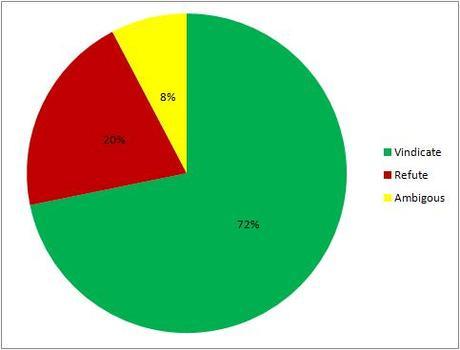Scientists are baffled! It seems like every other media report on science opens like that. Like news stories about the recent discovery that art may predate our species, which focused very much on how this research was something “we never expected to find” and “challenges” what we knew.
Whilst this might make a nice media narrative, it isn’t really representative of science as a whole. Yes, science doesn’t know everything. If it did we could all go home and that money could go on a few extra javelin missiles or something. But it isn’t as though researchers are blindly stumbling around in the dark either. There are hypotheses, theories and predictions that guide us. Palaeanthropologists don’t find fossils by just going to Africa, throwing a Frisbee and then digging a trench where it lands.
This misrepresentation of science is having some more nefarious consequences than just helping newspapers sell a few more copies. It fosters public misunderstanding of science and scientists; and undermines the credibility of the process. Creationists are already leaping on the “surprising” nature of the early art to try and invalidate human evolution. Creation Evolution Headlines notes
Everything in evolutionary paleoanthropology is a surprise, because they are so wrong, they are not even wrong. “Surprised” is the new normal. Hearing that a new finding will “challenge all we thought we knew” is normal. Reading that a new find raises big, hairy questions is normal. Hearing that it has “profound implications for human evolution” is normal. What would really be surprising would be to find an evolutionary anthropologist declare that a finding was just what they expected.
(hat tip to Ashley for pointing that article out)
So, to try and show that science works (bitches) I decided to do a bit of research into research. I examined all of the studies published in the journal Human Evolution in volumes 72 – 76; looking to see how often scientists really were baffled. The results are presented in a handy colour-coded chart below. Green represents research that vindicates an existing finding, red is when something disproves it and yellow is where the results are ambiguous1. Studies that didn’t examine any previous work were excluded from this examination.

I’m shocked, shocked I say! Well, not that shocked
As you can see in the vast majority of cases the research does vindicate existing findings. The results are what the scientists expected. Very little baffling anywhere.
It’s also worth noting that this is simply looking at how frequently existing research was challenged. Often, researchers think that an idea is flawed and will be disproven eventually; so it’s ultimate refutation hardly counts as baffling. Or it’s typically the case that two competing hypotheses are being compared. Whilst the researchers’ preferred idea might be disproven, there’s obviously another team out there who are quite happy (and completely unbaffled) by the results. In other words, my little study would significant overestimate how often researchers are befuddled. Yet it still shows that surprising, total refutations of ideas occur very rarely.
To put it bluntly, science works. Contrary to what the news media and creationsits would have you believe, we aren’t just stumbling in the dark without a clue. Oh, and clearly I now have many examples of palaeoanthropological discoveries that were “just what they expected.” So I look forward to the author of Creation Evolution Headlines to publish a follow-up talking about how surprised and baffled they are.
Notes
- Many studies examine multiple hypotheses (often because there are multiple hypotheses about a particular issue). When this happened, a study was counted as vindicated if the preferred hypothesis of the researchers was vindicated (e.g. “there’s hypothesis A and B. We test hypothesis A and vindicate it, proving hypothesis B wrong by proxy” would count as vindication). If there were a lot of issues being tested to the point where such an identification was impossible, the study was omitted from the examination. Also; if the primary goal of the study was vindicate that was also counted as a vindication, even if some minor aspects were refuted.

